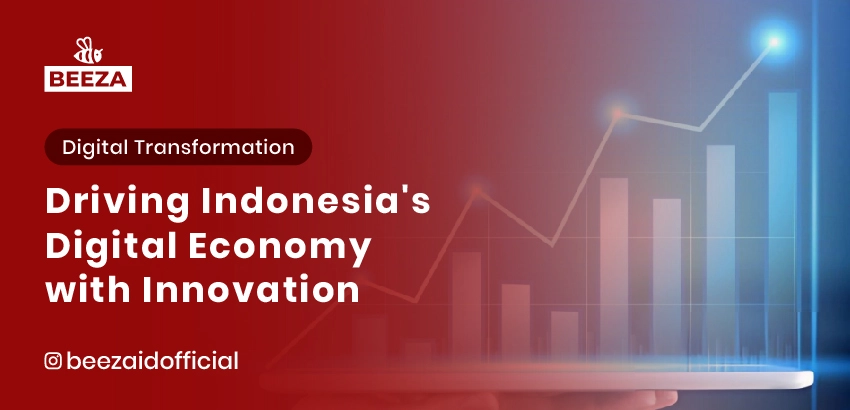
Indonesia, with a population of over 270 million, holds immense potential to become one of Southeast Asia’s digital economy hubs. Ongoing digital transformation across various economic sectors has unlocked new opportunities, from financial services to logistics and e-commerce. However, to fully realize this potential, continuous innovation, cross-sector collaboration, and strategic adoption of technology are essential.
This article explores the role of technology in supporting Indonesia’s digital economy growth, the challenges faced, strategic solutions, and how innovation can create an inclusive and sustainable digital ecosystem.
The Role of Technology in the Digital Economy
Technology serves not just as a supporting tool but as a key driver in building the digital economy. Here are some crucial roles technology plays in Indonesia’s digital transformation:
- Enhancing Financial Inclusion:
Technologies like eKYC and digital payments have enabled access to financial services for millions of previously unbanked individuals. App-based fintech solutions offer microloans, digital savings, and investment services to rural communities. - Operational Efficiency:
Automation and artificial intelligence (AI) enable businesses to process data faster, reduce human errors, and boost productivity. Cloud-based solutions provide businesses with the flexibility to manage operations from anywhere. - Data and Transaction Security:
Technologies such as biometrics, blockchain, and multi-factor authentication help protect user data and secure digital transactions from cyber threats. - Broader Market Access:
E-commerce platforms empower SMEs to reach customers across Indonesia and even tap into international markets.
Technological Innovations Driving Digital Economy Growth
Several technological innovations have proven impactful in supporting Indonesia’s digital economy:
- Digital Identity Verification:
eKYC technology facilitates online identity verification, expediting onboarding processes for financial services and e-commerce. - Artificial Intelligence (AI):
AI is utilized to analyze consumer behavior, recommend products, and detect fraud in real time. - Blockchain:
This technology enhances transparency in supply chains and security in financial transactions. - Digital Payments:
E-wallets and electronic payment apps make everyday cashless transactions easier for the public. - Big Data Analytics:
This technology provides businesses with valuable insights into market trends and consumer needs.
Challenges in Developing the Digital Economy
While technological innovations offer many benefits, some challenges must be addressed:
- Digital Divide:
Not all regions in Indonesia have adequate internet access, particularly in rural and remote areas. - Low Digital Literacy:
Many people still lack the knowledge to use digital technologies effectively and safely. - Cybersecurity Threats:
The growing number of digital transactions increases the risk of cyber threats such as hacking and online fraud. - Lack of Cross-Sector Collaboration:
Greater cooperation among government, businesses, and technology providers is needed to build a stronger digital ecosystem.
Solutions and Strategies to Overcome Challenges
To support inclusive and sustainable digital economy growth, the following strategic steps can be taken:
- Improving Digital Infrastructure:
The government and private sector must work together to expand internet networks nationwide. - Digital Literacy Programs:
Educate the public on using digital technology through training and awareness campaigns. - Investing in Cybersecurity:
Adopt technologies like biometrics and liveness detection to safeguard user data and digital transactions. - Encouraging Collaboration:
Governments, businesses, and tech startups should collaborate to create innovative solutions that support digital economy growth.
Case Study: Improving Financial Inclusion in Remote Areas
- Problem:
A fintech company struggled to reach communities in remote areas due to slow manual verification processes. - Solution:
The company adopted biometric-based eKYC technology, enabling online identity verification. - Result:
- Verification time reduced from several days to minutes.
- New user sign-ups increased by 40% within six months.
- Financial services became accessible to previously underserved communities.
Key Takeaways
- Technological innovation is a cornerstone of Indonesia’s digital economy.
- Technologies like eKYC, AI, and blockchain play vital roles in fostering efficiency, inclusivity, and security.
- Challenges such as the digital divide and cybersecurity threats require collaborative strategies.
- Investment in digital infrastructure and literacy is critical for Indonesia’s digital economy future.
Conclusion
Indonesia’s digital economy holds vast potential to drive national growth. With technological innovation, we can build an inclusive, secure, and sustainable ecosystem. Digital transformation is not just about technology adoption but about creating a positive impact on society and the economy as a whole.
Contact us for system integration solutions in verification, identification, credit scoring, digital signatures, and more for various industries.